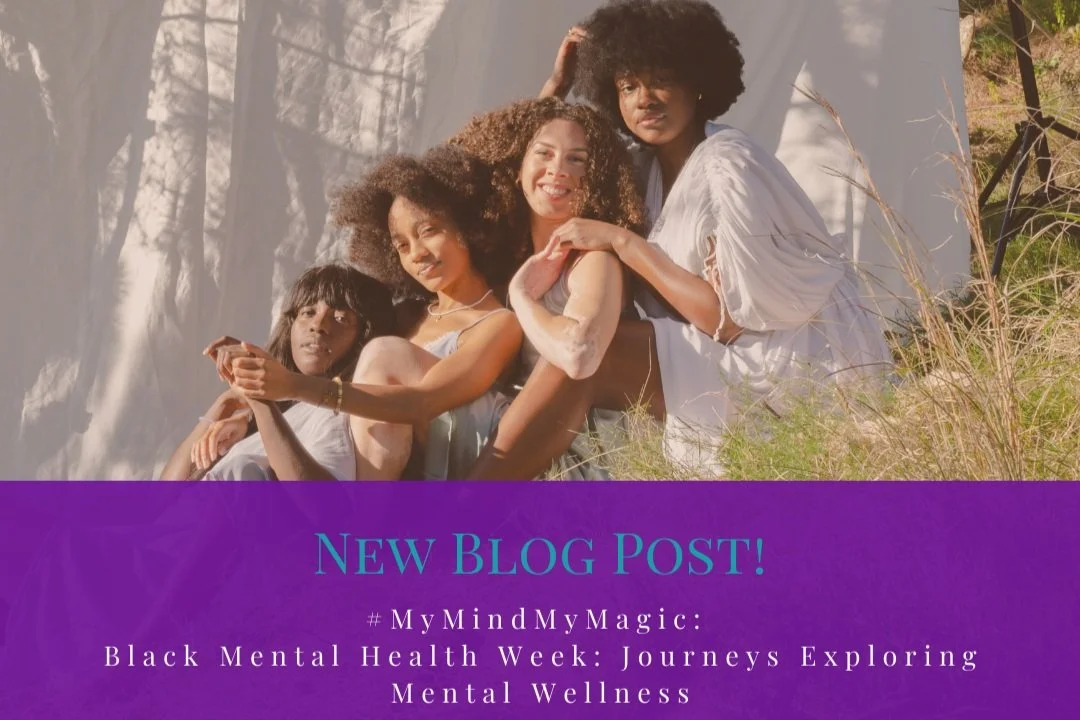#MyMindMyMagic: Black Mental Health Week: Journeys Exploring Mental Wellness
Adornment Stories believes in empowering Black women, femmes, queer, trans and non-binary folks to tell their stories through a plurality of creative means. We provide mental wellness inspiration, arts education and a platform for the voices of those who are often left out of mental health dialogue. Our model focuses on recognizing the unique ways gender, race, sexuality, and the fullness of our experiences impact mental health.
#MyMindMyMagic: Black Mental Health Week encourages folks of various identities to feel supported and a part of the Black mental health conversation. Each section is led by Black community members, artist and educators. We aim to create an inclusive space for those who often feel left out of mental health dialogues.
With a week of discussions and collaborations, we had to ask our community:
What has it felt like to navigate a dual pandemic of anti-Black racism and COVID-19 over the past few years, and what do you want the global mental health conversation to acknowledge? In addition, what activities, modalities or new ways of thinking have allowed you to access mental wellness support?
These are just a few of their stories.
“The pandemic revealed how much hurt was happening underneath the surface for me and who and what was causing the hurt.”
Navigating the pandemic and anti-Black racism over the last few years has been challenging. This challenge has impacted my mental health in ways I did not anticipate. The pandemic revealed how much hurt was happening underneath the surface for me and who and what was causing the hurt. It was difficult realizing that now that the world has sort of been forced to stop, your friends and even family’s anti-Blackness was more apparent than ever. Yet, it was conflicting because deciding to cut ties with people who were a part of your community during a time that you need them most felt gut wrenching. I think the global mental health conversation needs to acknowledge how phenomenon such as a pandemic impact and exacerbates the already terrible and deeply seated anti-Blackness around the world.
Anti-Black racism and mental health deserve to have their own supports because it is a unique issue that greatly impacts how Black people show up in the world and survive. However, even though I experienced additional challenges during the pandemic due to the pervasive anti-Blackness, I still managed to access activities and shift my thinking to be able to work on my mental wellness. For example, developing and creating community with another Black woman was a significant factor in how I navigated the pandemic. Another example is learning to practice joy and incorporate sprinkles of joy into my everyday life, whether that’s a short walk or changing my silk pillowcase every week, all of it continues to support my mental wellness.
ALAWIYA HASSAN
“It is traumatizing for us to experience racism, to live under constant fear of having to confront it, and to be met with disbelief and gas lighting when speaking up”
"What stands out most of all to me in navigating the pandemic and anti-Black racism is the exhaustion. The pure, unrelenting exhaustion of navigating two deadly forces for two years straight has made me feel completely depleted almost daily. My wish for the global conversation on mental health going forward would be for the mental health and wellness community to better grasp how racism manifests and how perpetrators traumatize their victim, as well the systemic nature of racism. It is traumatizing for us to experience racism, to live under constant fear of having to confront it, and to be met with disbelief and gas lighting when speaking up.
My wellness strategy to cope has been to fully embrace rest. I have been working on unravelling the myth that white supremacy and capitalism feeds us that says that we must earn our rest. I am framing rest as my right as a human being, not as something I have to justify or make excuses for. It has been a journey of unlearning, and my body, mind, and spirit feel nurtured as I pay closer attention to what I need and honouring that fully. When I'm not resting, I am practicing being conscious of my capacity and making time for things that I enjoy, mainly my friendships and my passions, without overextending myself."
STEPH PFLUGFELDER
“I need people to understand that the experiences of Black bodies is not a new one. People out here “discovering” things that have been out in plain sight. This frustration led me to turn to the Black community for support.”
Over the past few years my mental health has felt like the rose from beauty and the beast that sits in the glass case, fragile and waiting for redemption. Anti-black racism is hard enough to manage on a good day, but to combine it with the unpredictability and fear of a global pandemic has left me exhausted and nervous. The unpredictable emotional response from friends and families as they all of a sudden discovered Black Lives Matter in May 2020 has left me bewildered. I need people to understand that the experiences of Black bodies is not a new one. People out here “discovering” things that have been out in plain sight. This frustration led me to turn to the Black community for support. Here I have experienced strength, level headedness and adaptability. I have started to look at my mental health as a Black woman and not a woman who happens to be Black. This shift in perspective allows me to put my needs at the forefront instead of leaving it on the back burner
CHARISSA WHITTINGHAM
“Seeing all the injustice and tragedy happening in the world made me pause. ”
Please share with us in one paragraph, what has it felt like to navigate a dual pandemic of anti-Black racism and COVID-19 over the past few years, and what do you want the global mental health conversation to acknowledge? In addition, what activities, modalities or new ways of thinking have allowed you to access mental wellness support?
Experiencing the world in the past two years has allowed me to reflect on my thoughts and actions and also take a step back to see how this pandemic has gathered people and keep them 5ft apart at the same time. On top of worrying about spreading a virus to my family who has made the choice to be unvaccinated, I also made it a priority to keep my adventurous nature and experience new things. I was able to temporarily move out my family home, I got a new job which gave me more freedom by working remotely, and I planned a few trips to explore different parts of Canada.
Just as I was about to spread my wings and take off, tragedy after tragedy occurred with Breonna Taylor, George Floyd, and Ahmaud Arbery which sparked headlines (to name a few). Seeing all the injustice and tragedy happening in the world made me pause. I felt selfish for wanting all these things knowing my people were hurting and fighting everyday at protests to live as freely as I was about to. I wanted to go forward helping in any way I could yet, I felt stuck due to the mountain of curfews/restrictions placed on me by the government, fear, and Covid. And so I stayed home like the majority of people. Watching and waiting for something to change. Staying inside for so long made me question my productivity, my worth, and my body image.
I would like to the global mental health conversation to acknowledge how these past years has impacted the black community. I would like them to see how much of us are still hurting and in need of someone to hear us. I thankfully had a small group of friends that supported me in those tough times and I tried my best to support them as well. I reached out and sought counselling during my time alone and got the help I needed. I was also open to hearing how others access/practice mental wellness and tried to incorporate some of those ideas in my routine.
SANINI
““These events affect our mental health in lasting ways and we must be proactive in community care, support, and connection (by and for us)”
Whew, it’s a little difficult to describe what that experience was like as I think collectively, we are still feeling the effects. There have been a lot of drastic and devastating changes since the on-set of COVID-19. The grief and loss are hard to capture in words. And of course, this loss is felt most in our communities that are the most deliberately marginalized and continually oppressed. This, coupled with the ongoing issue of COVID-19 only increased the weight of that pressure.
These events affect our mental health in lasting ways and we must be proactive in community care, support, and connection (by and for us). The shift to virtual programming allowed me to attend sessions that I ordinarily would not have access to. There was an outpouring of community support available, and I was able to remain connected. And I was able to find that support in Adornment Stories programming.
Whatever forces called me to sign up for this program I’m glad I listened. It helped me become vulnerable with who I am and take pride and value in the journey. It was also a place where I felt cared for and seen – with people who encouraged me to speak up and grow in several ways! I was challenged to engage with a new craft and art form while connecting with and learning alongside others. It was mad cute; everyone is so talented! On top of that it was fun. In learning a new craft but also being encouraged to explore something meaningful to you that represented a journey was also a part of the wellness for me – it was one of many things that made this course so special! I am grateful to have made connections, learned new things, and explored creativity during such an isolating and challenging time.
JOY NORTEI
We would love to have further engagement and dialogue with this. Did any one impact or resonate with you? Share your reflections in the comments or tag us on social media.
adornment.stories on IG
adrnmnt.stories on Twitter
In partnership with the City of Toronto.

